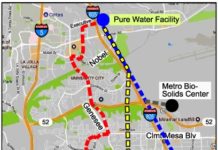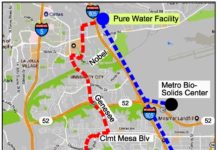by Daniel Smiechowski
If a rising tide lifts all ships, this indeed is Mr. Alvarez’s moment. The current Councilman is indeed both a man of the people and a man of the City. Mr. Alvarez is one of those rare candidates having the qualities of foresight, devotion, intellect and character which we all value in our next Mayor. As Robert Kennedy once said, “Only those that dare to fail greatly can ever achieve greatly.” Alvarez has the heart and courage of a lion and is a winning candidate.
DJS– Years ago under Donna Frye’s tenure representing Clairemont, we had a “City Storefront” in the Clairemont Square Shopping Center which enabled folks to interact with SDPD and pay water bills, get free tax help, have questions answered in regard to city services, pick up valuable city brochures and information as well as many more convenient city business. What is your view on restoring the operation of this “City Storefront?”
David Alvarez–The community service centers that were previously operating in a number of communities were shut down due to budget cuts under Mayor Sanders. I believe that these service centers served an important role in our communities because they were easily accessible locations that residents could use to speak with community police officers, pay their water bill or get information about City services. As such, I believe that reopening community service centers throughout the City is important step in bringing City government to our neighborhoods. As Mayor I would look to re-establish community services centers in areas that cannot easily access City services downtown.
DJS– Public Safety issues including Police, Fire, Ambulance, etc. are at the top of the list of citizen concerns. How do you propose to facilitate and improve the operation of these services in Clairemont?
David Alvarez– In 2011 the City paid outside experts to evaluate the City’s fire and emergency preparedness. What the experts found was troubling. Throughout the City there were critical gaps in coverage that make it impossible for our fire and life safety personnel to meet acceptable response times (7:30 minutes response 90% of the time). While these gaps in coverage are not in Clairemont, the delays cascade through the system as emergency response resources in Clairemont are pulled to cover gaps in other areas.
The only way to solve this problem is to invest in critically needed equipment and personnel, including 19 new fire stations across San Diego. Since 2011, I have pushed hard for the City to fund some of the top priorities, such as an updated fire alert system that will replace an antiquated and inefficient system by 2014. However, we still have a long way to go. The total cost of funding the projects, equipment and personnel identified by experts is approximately $139 million. The next most immediate needs, which include the construction of a new fire station on Home Avenue, completion of a Mission Valley station and equipment and personnel for both stations will cost a minimum of $17-$18 million. Finding the funding for these critical projects will be tough, but it must be done to prevent fire and medical emergencies from getting out of control. I will prioritize the safety of San Diegans by ensuring that we invest in our public safety infrastructure to make sure we, as a city, are doing all we can to get people help during times of emergency.
Regarding police services, a shortage of officers continues to impact public safety and response times in every neighborhood. As part of this year’s budget, I supported a recruitment and retention program aimed at keeping the highly qualified officers we have on our police force and recruiting the best candidates to go through our police academies.
DJS– Residents of Clairemont are complaining all the time over the state of our roads, broken signage, overflow of trash in gutters, weeds growing in streets and broken sidewalks. What is your plan to correct these issues and can the City afford to foot the bill?
David Alvarez–The state of the City’s infrastructure, such as roads and public buildings, has been allowed to deteriorate. While one survey put the backlog in deferred capital projects at $898 million, the actual number is certain to be much larger. To address the backlog of deferred capital projects, I supported cutting red tape to streamline the City’s contracting process and pushed to ensure communities were consulted regarding which projects were prioritized. I supported the issuance of $105 million in capital bonds to begin to address the deterioration of our infrastructure, as well as the City’s first 5-year deferred capital funding plan. Deferred Capital Bond #1 and #2 provided $85 million for asphalt overlay of 120 miles of streets.
Our infrastructure backlog didn’t develop overnight, and it will take many years to address all of our deferred projects. As Mayor, I will explore new sources of funding, such as general obligation bonds (which are voter-approved and at a lower interest rate, saving taxpayer dollars when compared to a traditional bond) and potential public-private partnerships to start rebuilding San Diego. Bonding while interest rates are low, and building while construction costs are relatively low will take careful planning, but will pay dividends in avoided and reduced maintenance costs. I will also dedicate significant portions of any surplus tax revenues to infrastructure needs, as prioritized by neighborhoods.
DJS– Along with a down economy comes increased use in public services, mainly libraries and parks. What is your philosophy regarding libraries and parks and would you improve upon these services?
David Alvarez–San Diegans know that the City’s lack of investment in neighborhoods has reached a crisis point. Eighty-five percent of our neighborhoods don’t have enough park space, even while shovel-ready park projects are stalled because of funding gaps. Through my Blueprint for San Diego’s Future, I’ll improve the quality of life of every neighborhood by building 50 acres of new parkland by the end of my first term and immediately increasing maintenance of our parks and expanding programming at recreation and senior centers. I will also continue my record on the Council of restoring library hours in every branch library.
DJS– In several years the Trolley will wind through our community bringing along security concerns among some residents. Do you know of plans by the City for increased vigilance in regard to possible criminal activity in and around Trolley Stations? Can you offer any specifics?
David Alvarez–I know that the City has a lot of planning to do regarding new stations along the planned mid-coast trolley extension. As plans for specific stations are still in the design phase, I would encourage SANDAG and MTS to consider public safety and security concerns when designing the stations.
DJS– Do you agree that there ought to exist a healthy business climate in Clairemont in order to drive employment and other issues defining our quality of life. What can the City accomplish in achieving this goal?
David Alvarez– Each community in San Diego deserves to have the opportunity to have business and employment opportunities nearby. Being able to work, shop and recreate close to your neighborhood is important in achieving a higher quality of life. Matching the right kind of economic development for each community is critical, as some neighborhoods might desire close proximity to hi-tech employment centers while others desire to bring broader investment such as attracting grocery stores, shopping centers and restaurants. Each area of the City deserves to have the business and employment opportunities that most matches the needs of the residents in that community. By focusing on investing in our neighborhoods and through updating and following our community plans, this can be accomplished.
The future of communities is driven in large part by community plans. In San Diego the majority of community plans are old, out-of-date and do not reflect the best practices in city planning. Therefore, development decisions are being driven by documents that no longer reflect the values and priorities of the residents who live in those communities. Obsolete plans also mean developers have to spend more time and money seeking community plan amendments and producing their own environmental impact reports. This extra cost prevents many developments from moving forward. Community plans provide our residents a direct voice in the future of their neighborhoods and provide the business community with the certainty needed to stimulate investment from the private sector. As Mayor, I will update all community plans that are over 15 years old by the end of his first term.
DJS– Some folks in Clairemont continue to complain about flight noise from Montgomery Field, a public airport owned by the City of San Diego. What are your views?
David Alvarez– Montgomery Field is an important facility that if operated the right way can continue to be successful while being respectful of the communities that surround it. The Airports Advisory Committee is a public group appointed by the City Council that exists to advise the City on airport related matters. It is critical that the Mayor and City Council appoint members to the board that understand the importance of listening to the public and working with airport administration to solve any problems. It is equally important that the public is aware of the important role the Committee can play in ensuring that noise related complaints from community members are heard and dealt with in an efficient and effective manner. As Mayor I would appoint members that understand the importance of protecting the quality of life of nearby residents and I would ensure that the Committee and Montgomery Field Airport staff is responsive to community concerns over noise caused by incoming and outgoing flights.
(The Airports Advisory Committee meets on the second Tuesday of each month at 3 p.m. at the Montgomery Field Airport Terminal Building, 3750 John J. Montgomery Drive.)
DJS– Will you be a Mayor of the people and for the people? How and why? And, what is the fire in your belly wanting you to become Mayor of San Diego?
David Alvarez–I’m running to become San Diego’s next mayor because we need a leader who will fight to make government work for the families and neighborhoods of our city–not for special interests. It is clear to me that we need to invest in and commit to the diversity that makes our city great and raises the quality of life for all members of our communities. That means transparency in government. It means having an honest and respectful public dialogue about civic issues and ensuring all voices have an opportunity to be heard. I will be a mayor for all San Diegans.
DJS– Thank you, Mr. Alvarez.
Daniel J. Smiechowski has been a resident of Clairemont since 1967 and may be reached at: smiechowskid@aol.com




